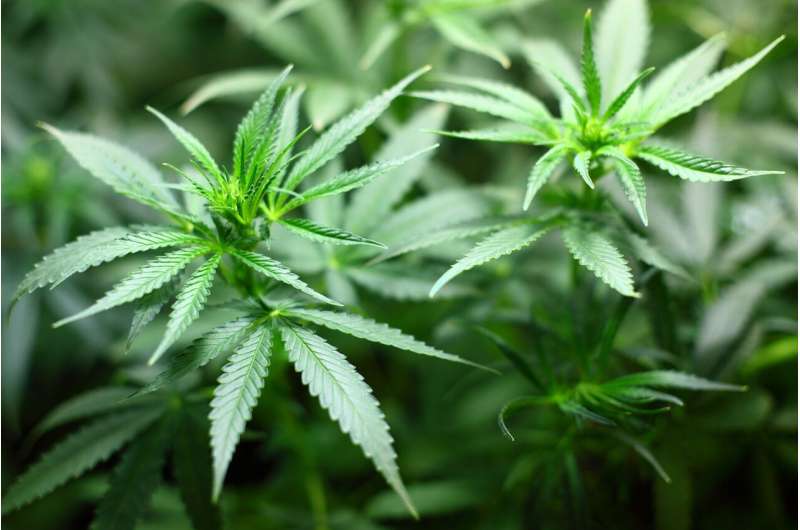This article has been reviewed according to Science X's editorial process and policies. Editors have highlighted the following attributes while ensuring the content's credibility:
fact-checked
peer-reviewed publication
trusted source
proofread
Adverse childhood experiences are 'strong predictor' for adolescent cannabis use

Young people who are exposed to adverse childhood experiences between the ages of 0—12 years, including parental drug misuse, are at highest risk for developing problematic adolescent cannabis use as teenagers, according to a new study.
The research, led by University of Bath psychologist, and expert in adolescent mental health, Dr. Lindsey Hines, analyzed outcomes for over 5,000 participants tracked using the Avon Longitudinal Study of Parents and Children—also known as the 'Children of the 90s' study.
Adverse childhood experiences ('ACEs') considered included physical, emotional and sexual abuse, emotional neglect, bullying, parental substance use, violence between parents, parental mental health challenges, and a parent being convicted of a criminal offense.
Through the study they combined these negative experiences in childhood with self-reported data about the frequency of cannabis use at various points between ages 13—24. Self-reported data ranged from individuals having never experimented with cannabis to using it regularly in their teenage years.
They found that people who had experienced four or more ACEs were more than twice as likely to use cannabis regularly as teenagers, compared to those who experienced low levels of ACEs. Teens who had grown up with parents who had abused drugs or alcohol, or had parents with mental health problems, were at the most risk of going on to regularly use cannabis.
Given the long-term mental and physical health implications of cannabis use at young ages, they are calling for much greater support to be put in place to help young people before cannabis use becomes engrained. Parts of the UK could learn from approaches like the cannabis support for young people offered by Bristol Drug Project (BDP), they say.
Dr. Lindsey Hines explained: "Our study is one of the first to comprehensively track adverse childhood experiences from birth, and to see how they relate to teenage cannabis use which can begin as early as 13. Through this, we observe a strong correlation between these difficult early life experiences and regular cannabis use in teenage years and young adulthood.
"A growing body of research is highlighting the challenges regular cannabis poses, in particular for young people's long-term mental health. With this study we wanted to focus on those factors underlying cannabis use, with the hope of informing more targeted interventions which in the future can help young people and their families."
The BDP is a charity providing harm reduction and treatment services for people who are experiencing a negative relationship with drugs and/or alcohol. With 36 years of experience, its goal is to support people towards the changes they want to see in their lives, no matter what they may be.
Hazel McMahon is one of BDP's New Leaf Cannabis Support Workers in its Youth team. She said: "Our youth team supports both young people who are using substances and those who are affected by someone else's substance use. Through working with these two groups concurrently we see the significant overlap in these populations daily. ACEs and other trauma are significant factors in steering the provision of our services.
"Our cannabis support group, New Leaf, utilizes a trauma-informed approach, and we build on protective factors known to reduce the negative impact of ACEs, such as having a positive and consistent relationship with an adult. We warmly welcome this research that evidences the link between ACEs and cannabis use, and we hope that it will influence the provision of specific cannabis support services for young people around the country."
In recent years public sector organizations in Bristol and Gloucester have spearheaded plans to increase awareness of ACEs in the public sector, with a goal of reducing early exposure to adversity. Dr. Hines' work suggests that doing so could significantly reduce patterns of harmful cannabis use in the next generation.
The full study "Adverse childhood experiences and adolescent cannabis use trajectories: findings from a longitudinal UK birth cohort" is published in the Lancet Public Health.
More information: Lindsey A Hines et al, Adverse childhood experiences and adolescent cannabis use trajectories: findings from a longitudinal UK birth cohort, The Lancet Public Health (2023). DOI: 10.1016/S2468-2667(23)00095-6


















